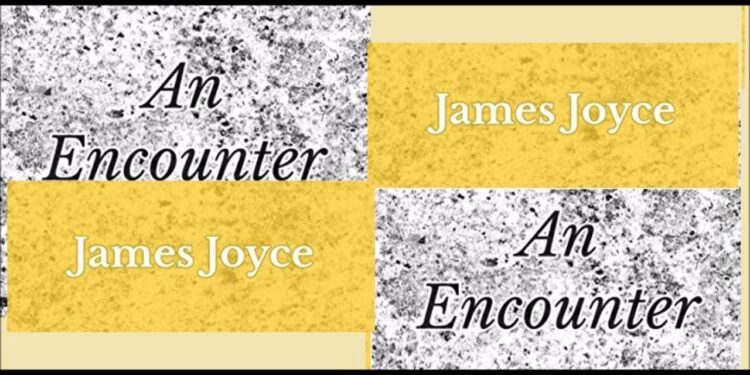Table of Contents
ToggleIntroduction
An Encounter Summary And Themes By James Joyce James Joyce (1882–1941) is considered one of the most influential writers of the modernist movement, known for his experimental use of language and deep exploration of the human psyche. His works, particularly Ulysses and Dubliners, have had a profound impact on literature, challenging traditional narrative techniques and offering complex depictions of everyday life. An Encounter, one of the short stories in Joyce’s 1914 collection Dubliners, is a prime example of his early style, which blends realism with a psychological depth that is characteristic of his later works.
An Encounter is a relatively short but powerful story that touches on themes of adolescence, escape, and the tension between innocence and experience. The story is about two young boys from Dublin who skip school in search of adventure, only to encounter a strange, unsettling man who represents a darker side of life. Through this encounter, Joyce explores the complexity of growing up and the loss of innocence, revealing the sometimes harsh realities that come with maturity.
Summary of An Encounter
An Encounter begins with a young boy, the narrator, reflecting on his adventures in Dublin. The story is told from the perspective of this unnamed boy, who is part of a group of friends. These boys, weary of the restrictions of school and the monotony of their daily lives, decide to skip school and embark on a small adventure. The narrator details how, one day, he and his friend Mahony agree to leave the school grounds and go on an excursion in search of something exciting.

The boys set off with the intent of seeking something “more,” something outside the realm of their normal routine. Their destination is somewhat vague—they are simply looking for a break from the dullness of their lives. As they wander through the streets of Dublin, the boys encounter a series of ordinary sights and experiences, but their journey quickly takes an ominous turn.
After some time, the boys part ways. Mahony, who is older and more brash, goes off in another direction, leaving the narrator alone. It is in this moment of solitude that the boy encounters a man sitting on a doorstep, who strikes up a conversation with him. The man, an older and disheveled figure, begins to ask the boy increasingly personal and unsettling questions, such as whether he would like to join him for a walk and what he would do if the man took him to a secluded place.
The man’s behavior grows more disturbing as the conversation continues, and the boy begins to feel a deep sense of discomfort and fear. He is initially unsure of how to respond to the man’s questions, and his growing unease leads him to recognize that this encounter is not the adventure he had hoped for, but rather a confrontation with the dangers that lie outside the protected world of childhood.
As the man’s intentions become clearer, the boy realizes that he must extricate himself from the situation. Feeling a mixture of shame and fear, he finds an excuse to leave the man and hurriedly makes his way home. The encounter leaves the boy with a profound sense of disillusionment and anxiety, marking a loss of innocence and a realization that the world is far more complicated and dangerous than he had imagined.
Themes of An Encounter
An Encounter explores a range of themes, from the naivety of childhood to the unsettling complexities of adulthood. Below are some of the central themes in the story:
1. Innocence vs. Experience
A central theme in An Encounter is the tension between innocence and experience, a theme that Joyce explores throughout Dubliners. The narrator begins the story with a sense of youthful idealism, excited by the idea of skipping school and embarking on an adventure. This sense of innocence, however, is shattered when he encounters the strange man, who represents the more disturbing and dangerous aspects of life. The boy’s journey from innocence to experience is encapsulated in this brief but impactful encounter, where the world he once saw as exciting and full of possibilities is revealed to be full of potential threats and unsettling encounters.
This theme is deeply connected to Joyce’s broader exploration of the limitations of childhood and the inevitability of growing up. The narrator’s experience is not just one of physical danger, but also an emotional and psychological awakening. The encounter forces the boy to recognize that the world is not as simple as he once thought, and that growing up involves confronting uncomfortable and often frightening realities.
Read more
2. The Search for Adventure and Escape
The narrator and his friend Mahony decide to skip school in search of adventure, symbolizing a desire to escape the constraints of their daily lives. For the boys, adventure represents freedom—a break from the monotonous routine of school and the expectations placed upon them. However, their quest for adventure takes an unexpected turn when the boy meets the strange man, whose actions reveal a darker, more dangerous side of the world.
In this way, Joyce critiques the idealization of adventure and escape. The boys’ naïve desire for excitement is thwarted by the harshness of reality, suggesting that the world outside the boundaries of childhood innocence is not always filled with the adventure they imagine. This theme also reflects Joyce’s broader commentary on the limitations of youthful optimism and the inevitability of facing life’s darker aspects.
Read more
3. The Fear of the Unknown
The encounter between the boy and the strange man is built around an underlying sense of fear and unease. The boy, though curious at first, becomes increasingly afraid as the conversation with the man takes a more sinister tone. This fear of the unknown is a key theme in the story, reflecting the boy’s realization that the world is not always a safe and predictable place. The man represents the unknown dangers that exist outside the controlled environment of childhood, where the boy’s interactions with others are usually more innocent and straightforward.
The boy’s fear is not only physical but also existential. As he grows more uncomfortable in the man’s presence, he begins to sense the complexity of the world around him—an awareness that is both frightening and enlightening. Joyce uses this fear to highlight the vulnerability of the young and the profound emotional impact that encounters with the unknown can have.
4. Alienation and the Loss of Innocence
The narrator’s feelings of alienation become evident as he becomes increasingly isolated from the world around him. As the boy begins to understand the implications of his encounter with the man, he feels a deep sense of disillusionment and alienation. This marks a loss of innocence, as the boy moves away from the protected, simple world of childhood into the complexities of adulthood.

Joyce portrays this loss of innocence as inevitable and central to the human experience. The boy’s initial enthusiasm and excitement for his adventure give way to confusion and fear, and in the process, he becomes acutely aware of his vulnerability. The loss of innocence is a theme that Joyce revisits throughout Dubliners, often focusing on how individuals must navigate the transition from childhood to adulthood, with all its challenges and disillusionments.
Read more
(FAQ)
1. What is the significance of the boys skipping school in An Encounter?
The boys’ decision to skip school represents a desire to break free from the rigid structure of their lives. It symbolizes a youthful longing for freedom, adventure, and the unknown. However, this sense of freedom quickly turns into a confrontation with the darker aspects of reality, demonstrating that the search for adventure can sometimes lead to uncomfortable or dangerous situations. The boys’ rebellion against authority sets the stage for the loss of innocence and the transition to a more mature understanding of the world.
2. Why does the strange man approach the boy in the story?
The strange man’s interaction with the boy is one of manipulation and power. While his exact motives remain ambiguous, the man seems to represent a threat that contrasts with the boy’s idealized notions of adventure. His approach is meant to unsettle the boy and force him to confront the darker, more dangerous side of the world. The man could be seen as a symbol of the corrupting forces that exist beyond the innocence of childhood, exposing the boy to a world that is both complex and unsettling.
3. What does the boy learn from his encounter with the man?
The boy learns that the world is not always as it seems. His initial excitement about the adventure gives way to fear and confusion, marking the beginning of his loss of innocence. He realizes that adulthood and experience involve not just wonder and excitement, but also fear, discomfort, and confrontation with the darker aspects of life. This encounter forces him to recognize the complexity of the world and the vulnerability that comes with growing up.
4. What does Joyce mean by the theme of the loss of innocence in this story?
The theme of the loss of innocence in An Encounter highlights the emotional and psychological transformation that occurs as children begin to understand the complexities of the world around them. The boy’s journey from excitement to fear mirrors the broader experience of growing up, where individuals must face harsh truths and confront uncomfortable realities. The story suggests that the loss of innocence is an inevitable part of maturation, one that often involves moments of discomfort and disillusionment.
Read more

















